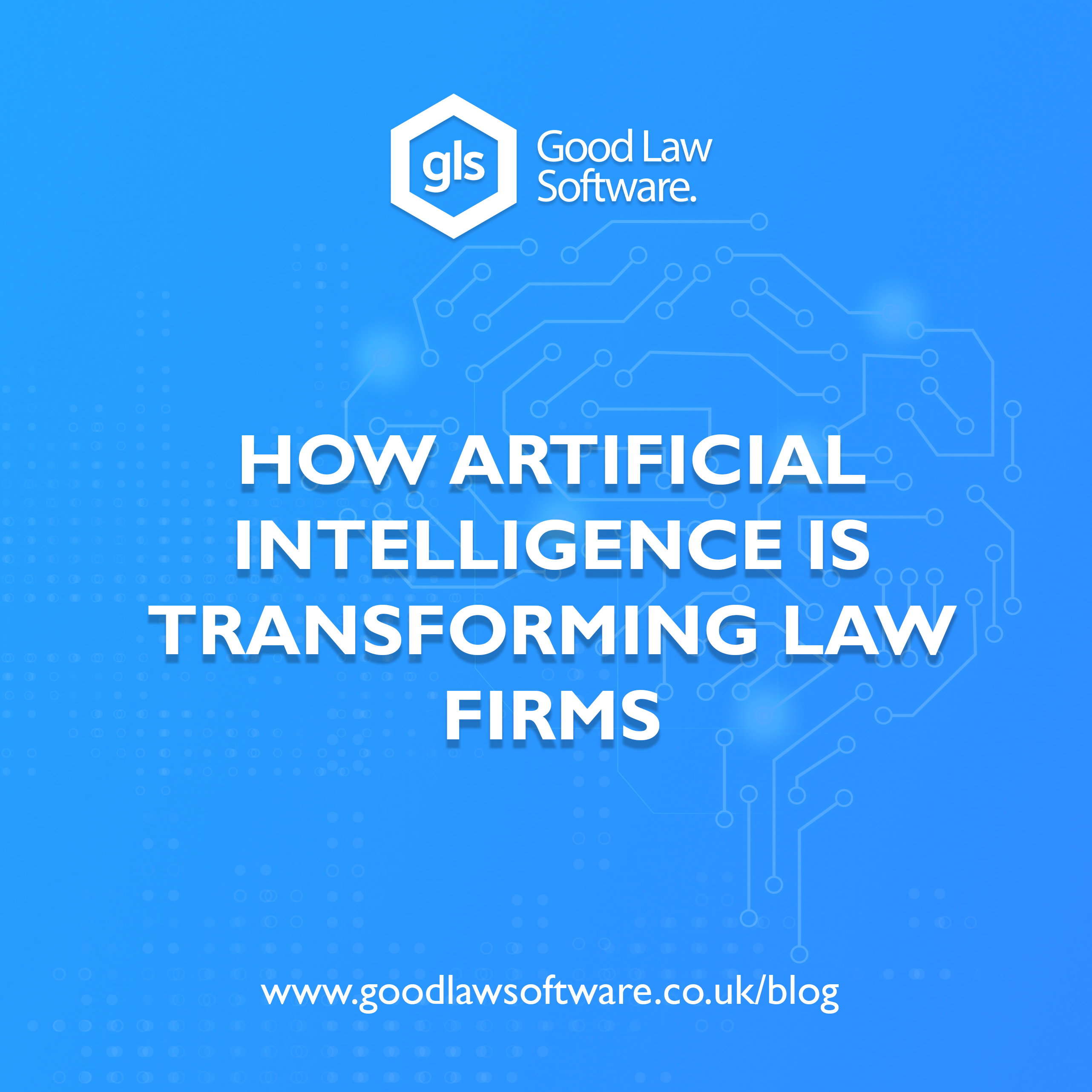How Artificial Intelligence is Transforming Law Firms

Written by Maryam Khan
Blogger

In today’s world, the importance of collecting and storing data is rapidly growing. Such data contains extremely valuable information for law firms. However, it takes a huge amount of time to analyse, organise and reconstruct this data into valuable information.
Although such tasks are extremely important, they are not time conducive when working in a demanding, fast-paced environment. This point is further proven by Deloitte, who, in a recent study, has estimated that approximately 100,000 legal roles will be automated by 2036 [1]. Here is where artificial intelligence comes in to transform the way law firms are operating and offering client services.
What is Artificial Intelligence?
Artificial Intelligence (AI) is perhaps the most interesting new development in the world of legal technology. The core idea behind artificial intelligence is programming computers with the ability to think and analyse information in a similar way to humans. Particularly, such computers must have the ability to reason with information, learn from it and make decisions.
AI technology today is very competent when it comes to identifying patterns and analysing large amounts of information. However, its abilities are limited when it comes to critical thinking. Resultantly, AI is reliant on human directives and cannot advise clients or replace lawyers in courtrooms [2].
How is AI currently being used?
Despite the legal sector being known as one of the slower moving industries in embracing technology, the incorporation of AI in law firms is rapidly increasing. A study conducted by CBRE uncovered that 48% of London law firms are already using AI, and a further 41% will start to do so in the near future [3].
Currently, AI is used for a variety of tasks in law firms. The four main areas where AI seems to be the most helpful are:
1) Due-diligence & Legal Research
AI has proven to be a useful tool for helping lawyers find relevant materials from large amounts of data. They can even identify patterns helping lawyers build a strategy based on the reasoning of previous cases [4]. AI also assists lawyers during the litigation process to discover background information that lawyers could not discover manually. Moreover, online legal information resources such as LexisNexis and Practical Law have incorporated AI technology to improve their search algorithms, enabling lawyers to find specific information relevant to their case [5].
When it comes to due diligence, lawyers are required to conduct comprehensive investigations. However, there can be risks for making mistakes and inaccuracy when lawyers check this data themselves due to human error. Here is where AI comes in to save time and money during the due diligence process [6].
2) Document Assembly & Automation
AI technology has been extremely effective in every part of document assembly, from creation to proofreading existing contracts and identifying inconsistencies and missing information [6]. Contracts can also be drafted using AI by answering simple questions and providing key information. Additionally, AI software can also scan existing contracts for any missing terms or information [7].
3) Predictive Analytics & Coding
Predictive analytics and coding are technology-assisted reviews that help in the e-disclosure process. It essentially helps rank documents in terms of how relevant they are in regards to disclosure [8]. Predictive analytics also uses AI software to forecast possible litigation outcomes. Using predictive analytics, law firms can use data from previous cases to discover win rates and identify trends and patterns in case law history [9]. A case in point is Nikolaos Aletras of University College London and his team using machine learning to analyse the text of the European Court of Human Rights where they have reported a 79% accuracy in their outcome prediction [10].
4) Electronic Billing
Electronic billing platforms provide an environmentally friendly alternative to paper-based invoicing. Conducting the entire billing process electronically allows more accurate reporting and tracking, makes it easier to make adjustments and avoids the huge overall cost of paper billing.
How are law firms benefiting from using AI?
1) Increased Efficiency:
The most obvious benefit of using legal technology in general, particularly artificial intelligence, is that it saves time. The amount of data computers can process simply cannot be matched by humans. From identifying relevant information in a set of documents to proofreading documents for mistakes, AI can accomplish in minutes what might take an experienced lawyer hours [11]. This has been especially true when it comes to legal research. One easy way to understand how AI would supplement legal research is to consider the way Google sifts through billions of files to find the relevant information when someone makes a search query. Legal AI technology can similarly supplement research, and as lawyers become more and more proficient in using these technologies, so does the AI in presenting more effective results.
2) Increased Accuracy & Quality of Work
The quality of a lawyer’s work and client service, in general, can be significantly improved using AI. Essentially, AI can develop a skill over time, similarly to how a lawyer can develop their legal skills with longer experience. The technology repeating tasks, learning from its mistakes becomes more and more proficient at performing its duties each time [12]. Through the rapid trial and error process in machine learning, AI technology can master the legal skills that take lawyers years of industry experience to acquire in a far shorter duration. Hence, AI can more accurately identify inconsistencies in any document, from missing clauses to poorly used terminology. In this way, AI can improve the consistency and quality of any piece of work.
3) Increased Focus on Difficult Tasks
For the time being, there are certain limitations to what current AI technology can do. In the current landscape, AI is most useful for what can be described as “lower-level” tasks. These tasks are typically not too difficult but can often be time-consuming and require the processing of large amounts of information. Many aspects of legal work require creativity, analysis and reasoning that AI cannot offer. However, by freeing up time for lawyers, AI allows them to focus on the “higher level” work [13]. Furthermore, AI can still help perform some higher-level tasks, but this will require more investment into the programming and creation of such software.
4) Increased Revenue
It seems clear why so many major firms are spending so much money developing AI tools and incorporating them into their legal practice. This is because, across almost every industry, utilising AI has increased productivity and revenue. According to a report by Accenture, businesses that moved towards AI technology had an estimated boost in revenue of 38% [14]. This can be seen as quantitative evidence of how AI is benefiting businesses, including law firms.
5) Increased Client Satisfaction
With more time on their hands, lawyers can focus on the most important aspect of legal service delivery; client relationship management. Building client relationships is a crucial task for a lawyer- a task that AI is not likely to master. However, with the advancement of AI technology, lawyers have more time to build a better relationship with their clients and better guide them through a case strategy or how their business is being managed [15]. This, coupled with the better performance of their duties due to the AI, leads to a higher client satisfaction rate.
6) Increased Wellbeing
Many tasks lawyers would typically have to do on a daily basis can be quite tedious. Proofreading and reviewing complex documents can often be very difficult and frustrating for a lawyer. One can even say that these administrative tasks do not adequately use a trained lawyer’s skill set. Handing these tasks over to AI technology allows lawyers to focus on work that requires problem-solving, critical thinking and strong analytical skills [16]. This work is not just more intellectually stimulating but also much more rewarding. It is also perhaps the hardest aspect of being a lawyer. AI allows lawyers to focus on this aspect of the job and helps reduce burnout. Thus, lawyers are less likely to be overworked and can better focus on the more complex elements of the profession [17].
Conclusion
Artificial Intelligence is becoming more and more advanced by the day, assisting lawyers and improving practices worldwide. There seems to be a general trend of firms investing in AI technology as it seems to be where the future of the legal industry is heading. It also has quite an interesting impact on the role of lawyers and what skills are expected of them. Being able to utilise AI to its fullest can be a very important adaptation for law firms to gain a competitive edge. Overall, incorporating AI has almost been universally beneficial for law firms. Ultimately, there is also the exciting prospect of how strong these AI computers can become and what other aspects of the profession these technologies will assist within the near future.
References
[1] CBRE, ‘London Law FIrms Embrace Aritifical Intelligence’ (2018) at https://news.cbre.co.uk/london-law-firms-embrace-artificial-intelligence/
[2] The National Law Review, “The future of AI in law: changing the legal landscape” (2021) https://www.natlawreview.com/article/future-ai-law-changing-legal-landscape
[3] Deloitte
[4] The Law Society “Six ways the legal sector is using AI right now” (2018) at https://www.lawsociety.org.uk/en/campaigns/lawtech/features/six-ways-the-legal-sector-is-using-ai
[5] Ibid
[6] Ibid
[7] Ibid
[8] Ibid
[9] Daniel Faggella, ‘AI in law and Legal Practice – A Comprehensive View of 35 Current Applications’, Emerj (2020) at https://emerj.com/ai-sector-overviews/ai-in-law-legal-practice-current-applications/
[10] Ibid
[11]Avaneed Parwaha (Law Technology Today), “ Seven Benefits of Artificial Intelligence for Law Firms” (2017) at https://www.lawtechnologytoday.org/2017/07/seven-benefits-artificial-intelligence-law-firms/#:~:text=Seven%20Benefits%20of%20Artificial%20Intelligence%20for%20Law%20Firms.,Risk%20Assessment.%20AI%20Produces%20Higher-Quality%20Work.%20AI%20
[12] Sterling Miller (Thomas Reuters), “Artificial intelligence and its impact on legal technology: to boldly go where no legal department has gone before” at https://legal.thomsonreuters.com/en/insights/articles/ai-and-its-impact-on-legal-technology
[13] Ibid (n6)
[14]Soojung Chang, “The Benefits of using Artificial Intelligence in Law” (2018) at https://blog.rossintelligence.com/post/benefits-ai-law
[15] Ibid (n9)
[16] Ibid (n9)
[17] Ibid (n9)








